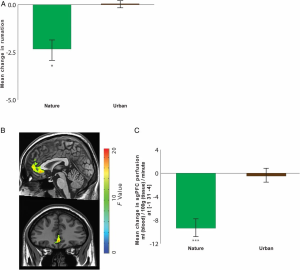Nature Experience Reduces Rumination and Subgenual Prefrontal Cortex Activation
Citation
Bratman, G. N., Hamilton, J. P., Hahn, K. S., Daily, G. C., & Gross, J. J. (2015). Nature experience reduces rumination and subgenual prefrontal cortex activation. Proceedings of the National Academy of Sciences, 112(28), 8567-8572.
Cities offer many advantages, but living in urban areas is also linked to higher rates of mental health problems, such as depression. One possible reason for this is that people in cities often have less contact with nature.
Researchers wanted to understand how a lack of nature might affect mental health. They focused on rumination—when people get stuck thinking about negative experiences or feelings. Rumination is known to increase the risk of depression and other mental illnesses.
In this study, healthy volunteers took a 90-minute walk either in a natural area or in the city. Those who walked in nature reported thinking less about negative things afterward. They also showed reduced activity in a part of the brain (the subgenual prefrontal cortex) that is linked to rumination. People who walked in the city did not show these benefits.
These results suggest that spending time in nature may help protect mental health by reducing harmful patterns of negative thinking. As our world continues to urbanize, proving easy access to natural spaces may be an important way to support emotional well-being.
Abstract

Significance
More than 50% of people now live in urban areas. By 2050 this proportion will be 70%. Urbanization is associated with increased levels of mental illness, but it’s not yet clear why. Through a controlled experiment, we investigated whether nature experience would influence rumination (repetitive thought focused on negative aspects of the self), a known risk factor for mental illness. Participants who went on a 90-min walk through a natural environment reported lower levels of rumination and showed reduced neural activity in an area of the brain linked to risk for mental illness compared with those who walked through an urban environment. These results suggest that accessible natural areas may be vital for mental health in our rapidly urbanizing world.
Abstract
Urbanization has many benefits, but it also is associated with increased levels of mental illness, including depression. It has been suggested that decreased nature experience may help to explain the link between urbanization and mental illness. This suggestion is supported by a growing body of correlational and experimental evidence, which raises a further question: what mechanism(s) link decreased nature experience to the development of mental illness? One such mechanism might be the impact of nature exposure on rumination, a maladaptive pattern of self-referential thought that is associated with heightened risk for depression and other mental illnesses. We show in healthy participants that a brief nature experience, a 90-min walk in a natural setting, decreases both self-reported rumination and neural activity in the subgenual prefrontal cortex (sgPFC), whereas a 90-min walk in an urban setting has no such effects on self-reported rumination or neural activity. In other studies, the sgPFC has been associated with a self-focused behavioral withdrawal linked to rumination in both depressed and healthy individuals. This study reveals a pathway by which nature experience may improve mental well-being and suggests that accessible natural areas within urban contexts may be a critical resource for mental health in our rapidly urbanizing world.
Related Media
- Nature May Be Key to Strengthening Our Attention (November 28, 2023)
- Stanford researchers find mental health prescription: Nature (June 30, 2015)